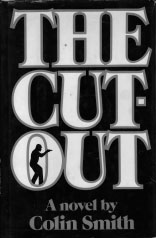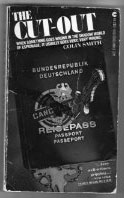Collateral Damage
AUTHOR’S NOTE
Collateral Damage was first published by Andre Deutsch in London in 1980 and a year later by Viking Press in New York where it also came out as an Ace Charter paperback. A small film option negotiated by Patrick Seale, my literary agent at the time, came to nothing but I haven't given up hope.
The book's original UK title was Cut-Out and in the US The Cut Out. The American rights were acquired for Viking Press by the celebrated Alan D. Williams, Viking's versatile editor whose authors ranged from Nobel Prize winner Nadine Gordimer to Frederick Forsyth. (He famously snapped up Forsyth's debut blockbuster The Day of the Jackal for $8,500 which even in 1971 was small money.) For reasons that escape me, Alan insisted on inserting the definite article into the title of the American edition and wrote me a charming letter about it.
Cut-Out is an espionage term that refers within a network to an intermediary between cells or levels of command so that in the event of capture they know as little as possible about each other. The novel is set in the 1970's and mostly takes place in London, Paris, Lebanon and Nicosia. In some scenes I draw heavily from my own reporting of the fighting between the Israelis and the Palestinians in southern Lebanon. But it is also a logical progression from Carlos: Portrait of A Terrorist, my biography of the Venezuelan Ilich Ramirez Sanchez for one of its two main protagonists is Hans Koller, a German anarchist of the kind employed by certain Palestinian factions in those times who were the subject of Jillian Becker's clever Hitler's Children. The other is Stephen Dove, a rugby playing - “shoulders that would stop a tank attack” - British school teacher whose hopelessly unfaithful wife Emma is Koller's unintended victim.
In Paris Koller receives orders from his cut-out to plant a bomb in a man's car. But although his target is a politically moderate Palestinian publisher, whose views is indeed anathema to the German's paymasters, he begins to suspect that all is not as it should be. Unfortunately there is no way to check back. That is the beauty of the cut-out system. It is also its deadly flaw.
Dove knows nothing about cut-outs or any of the apparatus of the long twilight war fought between the organs of state power and those who, for good or bad, challenge it. All he knows is that his wife was the random victim of a bomb and nobody seems to be doing anything about it. Steeled by his grief, he gets hold of a gun and goes after Koller. But the terrorist, whose own fanaticism is a reaction to an older one preached by his Nazi father, is also tracking the conspiracy behind his betrayal. They are both vulnerable.
Cut Out, as it was, benefited from the editing of Faith Evans at Andre Deutsch who also handled Carlos and would later become one of London’s leading literary agents. It was my first published novel and was particularly well reviewed in America where it was hailed as “a stunning debut” and a “top rank thriller”. Of course, like most first novels it tries to be more than this. There is a good deal of debate in about exactly what constitutes terrorism and, over three decades later, it seems to me that we are still rehearsing some of the same arguments.
 |
|
 |
Original American hardback cover |
|
Original American paperback |
|

